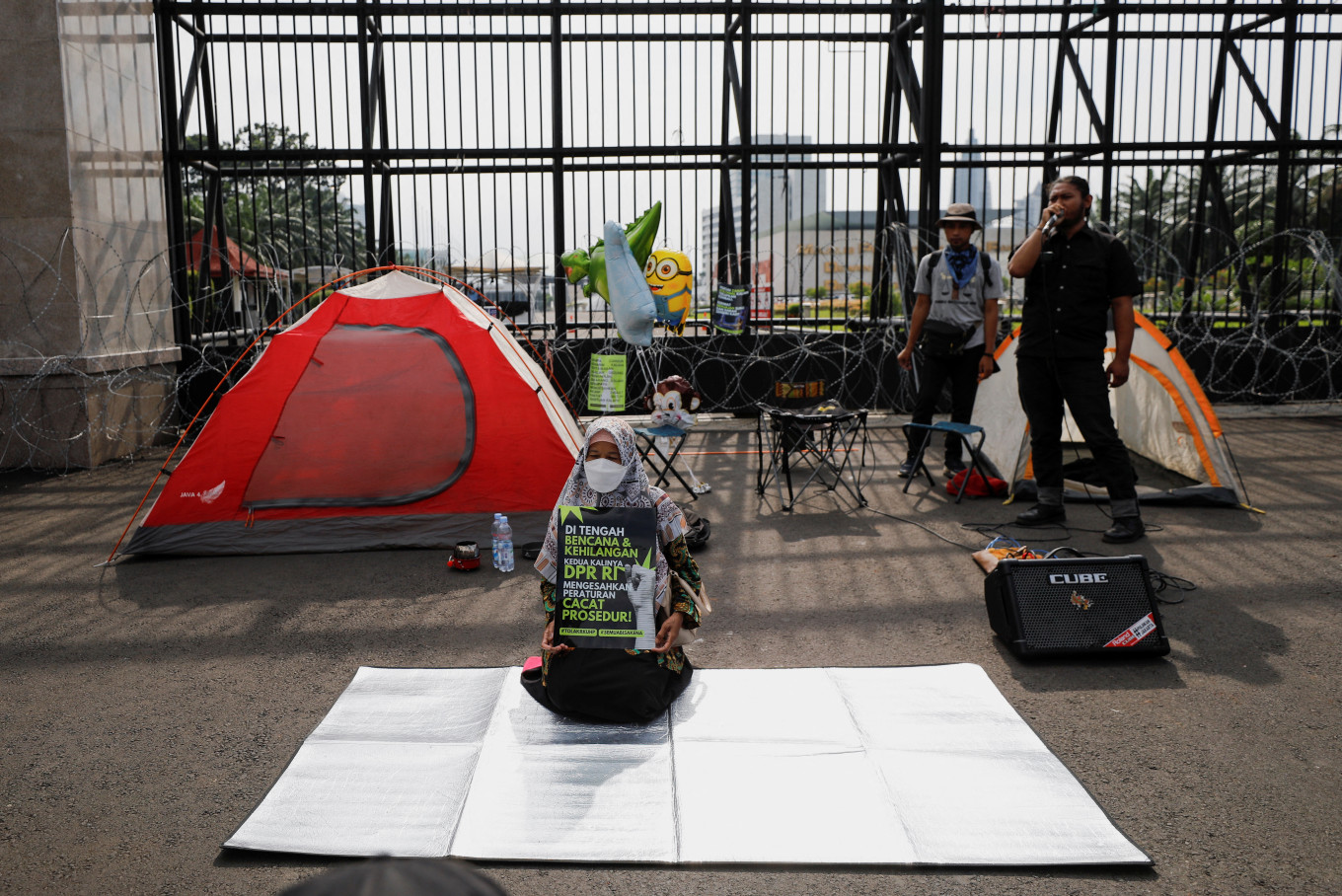Popular Reads
Top Results
Can't find what you're looking for?
View all search resultsPopular Reads
Top Results
Can't find what you're looking for?
View all search resultsAnother landmark ruling
Similar provisions in the old criminal code had been revoked by the Constitutional Court in 2006 and 2007, respectively, on the grounds that they undermined freedom of expression.
Change text size
Gift Premium Articles
to Anyone
 Activists take part in a protest after the House of Representatives approved a new criminal code that will ban sex outside marriage, cohabitation between unmarried couples, insulting the president and expressing views counter to the national ideology, outside the House buildings in Jakarta on Dec. 6, 2022.
(Reuters/Willy Kurniawan)
Activists take part in a protest after the House of Representatives approved a new criminal code that will ban sex outside marriage, cohabitation between unmarried couples, insulting the president and expressing views counter to the national ideology, outside the House buildings in Jakarta on Dec. 6, 2022.
(Reuters/Willy Kurniawan)
L
ast week, two lecturers, a student and a content creator joined forces in filing a judicial review motion with the Constitutional Court in their effort to remove controversial provisions from the new penal code, which they deem undemocratic as they could lead to the imprisonment of people for insulting a sitting president and the government.
It is not an exaggeration for us to suggest that the petition represents the voices and minds of the silent majority in this country, who are concerned, even frustrated, by the creeping regression of democracy. The new Criminal Code, despite the noble intentions of the drafters to decolonize the law, is one of the manifestations of this democratic setback.
Specifically, the petitioners demand that the court annul articles 218, 219, 240 and 241.
Articles 218 and 219 say attacking the dignity of a sitting president is a crime punishable by up to three years in prison, and up to four years if committed using a technical device. Articles 240 and 241 threaten to penalize those insulting the government, the House of Representatives, the Regional Representatives Council (DPD), the Supreme Court or the Constitutional Court with a maximum sentence of up to 1.5 years, and three years if committed using a technical device.
The amendment to the old penal code was mired in controversy over its reintroduction of the once repealed lèse-majesté provisions, as well as the inclusion of other provisions that restrict civil rights and individual liberties.
Similar provisions in the old criminal code had been revoked by the Constitutional Court in 2006 and 2007, respectively, on the grounds that they undermined freedom of expression and were subjected to multiple interpretations at the expense of legal certainty.
But the government and the House insisted on reinstating them in the new penal code, claiming the new provisions were different from the old ones. According to the new Criminal Code, insulting the president is a complaint offense, meaning an investigation will only start if the president or the offended parties file a report with the police.
Criticism, including that voiced during a demonstration or in "self-defense", are not subject to the provisions. Still there is enough enforcement room in the articles to curb free speech.
The policymakers turned a deaf ear to opponents of the contentious articles, passing the revised penal code into law while asking those who objected to challenge the new legislation in court.
But the justices who repealed the controversial articles in 2006 and 2007 are no longer seated in the Constitutional Court. Many have cast doubt on whether fighting the case in court today will make any difference amid the dwindling trust in the Constitutional Court, particularly after the House’s controversial removal of a House-nominated court justice for a lack of loyalty to the legislative power. The justice had ruled against the job creation bill, which the House supported.
As part of the judicial power, the Constitutional Court should demonstrate its independence from any influence, especially from the executive and legislative powers, or else the checks-and-balances mechanism will be at risk. In adjudicating the judicial review motion, the court justices could simply refer to the previous landmark ruling.
As guardians of constitutional democracy, the Constitutional Court justices should take into consideration the damage the controversial provisions will do to hard-won civil liberties. They have the opportunity to deliver another landmark decision.










